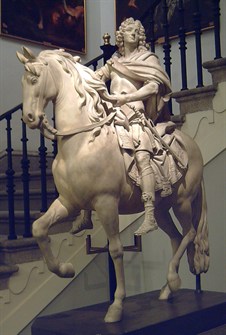Philip V of Bourbon
 The grandson of Louis XIV of France, Philip V of Bourbon (1683-1746), the former Duke of Anjou, ascended the throne of Spain in 1700, boasting the most direct relationship with the deceased King Charles II. However, it was not until the peaces of Utrecht (1713) and Rastadt (1714), and the War of the Spanish Succession (1701-1713), that he finally saw his rights recognized, however, in exchange for giving up a substantial part of the ancient possessions of the Habsburgs, in particular in the Italian territories and the Southern Netherlands. After leaving the government with his eldest son Louis for some months in 1724 who then died of smallpox, Philip returned to the throne and sought, following years, to regain the lost territories by taking part in the War of the Polish Succession (1733-1738) and the War of the Austrian Succession (1741-1748). In this way the Kingdoms of Sicily and Naples (Treaty of Vienna of 1738) were recovered. In domestic policy, Philip V and his ministers committed themselves to a series of reforms of the kingdom, starting with the Nueva Planta decrees, enacted in 1707 that canceled local governments, changing the relationship between Madrid and the provinces significantly: the kingdoms of Aragon, Valencia, Mallorca were thus abolished and the respective assemblies such as the Cortes, while municipalities were established, along with the role of the mayor. At the central level, the Consejos of Aragón, Italy and Flanders were eliminated and the Departments of State, composed by officials appointed by the King were born and coordinated by the Secretary of State. Other important reforms regarded the tax system, education and the military.
The grandson of Louis XIV of France, Philip V of Bourbon (1683-1746), the former Duke of Anjou, ascended the throne of Spain in 1700, boasting the most direct relationship with the deceased King Charles II. However, it was not until the peaces of Utrecht (1713) and Rastadt (1714), and the War of the Spanish Succession (1701-1713), that he finally saw his rights recognized, however, in exchange for giving up a substantial part of the ancient possessions of the Habsburgs, in particular in the Italian territories and the Southern Netherlands. After leaving the government with his eldest son Louis for some months in 1724 who then died of smallpox, Philip returned to the throne and sought, following years, to regain the lost territories by taking part in the War of the Polish Succession (1733-1738) and the War of the Austrian Succession (1741-1748). In this way the Kingdoms of Sicily and Naples (Treaty of Vienna of 1738) were recovered. In domestic policy, Philip V and his ministers committed themselves to a series of reforms of the kingdom, starting with the Nueva Planta decrees, enacted in 1707 that canceled local governments, changing the relationship between Madrid and the provinces significantly: the kingdoms of Aragon, Valencia, Mallorca were thus abolished and the respective assemblies such as the Cortes, while municipalities were established, along with the role of the mayor. At the central level, the Consejos of Aragón, Italy and Flanders were eliminated and the Departments of State, composed by officials appointed by the King were born and coordinated by the Secretary of State. Other important reforms regarded the tax system, education and the military.
Read more:
- J. Lynch, Bourbon Spain, 1700-1808, Oxford 1989.
- H. Kamen, Philip V of Spain. The King who reigned twice, New Haven and London 1997.
